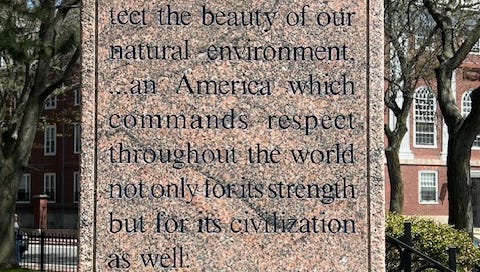“I look forward to a great future for America, a future in which our country will match its military strength with our moral restraint, its wealth with our wisdom, its power with our purpose. I look forward to an America which will not be afraid of grace and beauty, which will protect the beauty of our natural environment, which will preserve the great old American houses and squares and parks of our national past, and which will build handsome and balanced cities for our future.”
John F, Kennedy, Remarks at Amherst College upon receiving an Honorary Degree. Robert Frost was Lecturer of Literature at Amherst College until his death in January 1963. JFK goes on to say:
Robert Frost said:
Two roads diverged in a wood, and I--
I took the one less traveled by,
And that has made all the difference.
I hope that road will not be the less traveled by, and I hope your commitment to the Great Republic's interest in the years to come will be worthy of your long inheritance since your beginning.
This day, devoted to the memory of Robert Frost, offers an opportunity for reflection, which is prized by politicians as well as by others, and even by poets, for Robert Frost was one of the granite figures of our time in America. He was supremely two things: an artist and an American. A nation reveals itself not only by the men it produces but also by the men it honors, the men it remembers.
In America, our heroes have customarily run to men of large accomplishments. But today this college and country honors a man whose contribution was not to our size but to our spirit, not to our political beliefs but to our insight, not to our self-esteem, but to our self-comprehension. In honoring Robert Frost, we therefore can pay honor to the deepest sources of our national strength. That strength takes many forms, and the most obvious forms are not always the most significant. The men who create power make an indispensable contribution to the Nation's greatness, but the men who question power make a contribution just as indispensable, especially when that questioning is disinterested, for they determine whether we use power or power uses us.
Our national strength matters, but the spirit which informs and controls our strength matters just as much. This was the special significance of Robert Frost. He brought an unsparing instinct for reality to bear on the platitudes and pieties of society. His sense of the human tragedy fortified him against self-deception and easy consolation. "I have been" he wrote, "one acquainted with the night." And because he knew the midnight as well as the high noon, because he understood the ordeal as well as the triumph of the human spirit, he gave his age strength with which to overcome despair. At bottom, he held a deep faith in the spirit of man, and it is hardly an accident that Robert Frost coupled poetry and power, for he saw poetry as the means of saving power from itself. When power leads men towards arrogance, poetry reminds him of his limitations. When power narrows the areas of man's concern, poetry reminds him of the richness and diversity of his existence. When power corrupts, poetry cleanses. For art establishes the basic human truth which must serve as the touchstone of our judgment.
The artist, however faithful to his personal vision of reality, becomes the last champion of the individual mind and sensibility against an intrusive society and an officious state. The great artist is thus a solitary figure. He has, as Frost said, a lover's quarrel with the world. In pursuing his perceptions of reality, he must often sail against the currents of his time. This is not a popular role. If Robert Frost was much honored in his lifetime, it was because a good many preferred to ignore his darker truths. Yet in retrospect, we see how the artist's fidelity has strengthened the fibre of our national life.
I photographed this chiseled stone at Harvard’s Kennedy School of Government in Cambridge, as I crossed the sycamore-shaded Memorial Avenue from the Charles River. Thank you, Harvard, for standing up against oppressive government at great expense.






Thanks Rob.
Thank you for sharing this, Rob. I didn’t know about Frost’s influence or Kennedy’s powerful words at Amherst. what a moving tribute to the role of art and conscience.